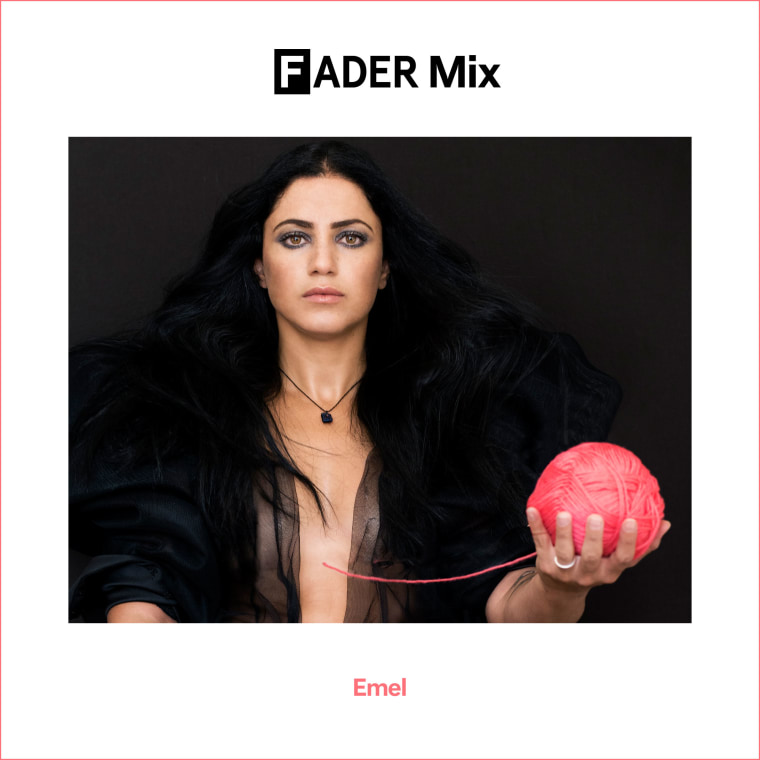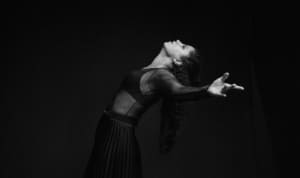 Photo by Julien Bourgeois
Photo by Julien Bourgeois
In late December 2010, Tunisia's people took to the streets to protest the corrupt leadership of president Zine El Abidine Ben Ali, who had been in power for more than 20 years. In the months that followed, the Tunisian Revolution successfully ousted Ben Ali and helped bring a democratic parliamentary system to the North African nation. Along the way, a song by a Tunisian artist with extraordinary range called Emel Mathlouthi went viral in her home country, and was later adopted by Arab Spring protesters. One listen and it's not hard to understand why: "Kelmti Horra," which means "my word is free" in Arabic, is the kind of string-backed anthem that hits the chest hard and makes you wonder about your soul.
Now living in New York and going by her first name, Emel is gearing up to release her new border-destroying album, Ensen, via Partisan Records this February 24. To celebrate, she's put together a spirited FADER Mix featuring traditional music from Tunisia, Algeria, Egypt, and Mauritania. As she explains in the interview below, now is the time to look beyond our own backyards. "Growing up in Tunisia we were so open to anything that came from the West," she explains. "It wasn’t a big deal that it was from the other side of the world, and that we didn’t understand the lyrics... it’s such a shame that the connectivity and the openness doesn’t work both ways. Maybe this moment will help open ears and hearts."
Where are you right now? Please describe your surroundings.
My living room, in Harlem. I have piles of CDs and vinyls to sign and mail to the wonderful people who supported my crowdfunding campaign. I am on an old red retro couch, very ornate with gold trim. Behind me on the wall, like a mural, hangs a colorful cloth I got in Yemen on tour 8 years ago— it's actually what women use to cover themselves, but unfolded. Sunlight is beaming through the room. My husband and daughter are here, and our daughter’s toys are all over the place. My friend Simge is here helping out and also just being cool.
Tell us a bit about this mix — what do you imagine people doing while listening to it?
This mix is a selection of a few of the most powerful tracks that I came across in my life. They are from Tunisia and nearby countries like Algeria, Egypt, and Mauritania. Of course, they are not technically part of the list of banned countries but man, how I don’t feel the difference!
While preparing the mix I was filled with two very contrasted feelings: a big rage and a big euphoria. A big rage because the “ban” campaign is against an entire culture, not just a set of countries, and I feel angry for all of us and impacted personally as part of the Muslim and Arab communities, culturally speaking. And a euphoria because I was like, god when people hear these crazy tunes they’re going to be just jumping on their chairs just like I am doing right now — how we tend to forget that music can be a dumb ass power in the most positive ways! They’ll be thrilled to discover that those countries deliver a huge mass of interesting civilization and art and music and culture that the West needs to know more about.
Growing up in Tunisia we were so open to anything that came from the West, we would listen to our own stuff, but we would be fond of hip-hop, death metal or psychedelic rock. It wasn’t a big deal that it was from the other side of the world, and that we didn’t understand the lyrics. Why would people elsewhere not want to hear other creations, it’s such a shame that the connectivity and the openness doesn’t work both ways. Maybe this moment will help open ears and hearts.
What's your earliest musical memory?
My dad’s vinyls. He blasted them every weekend when we were young, at home in Tunis, the capital of my country. Mostly great classical music and old jazz and blues, but a few protest singers as well from Egypt or Latin America. If there were lyrics, he would sing along with his larger-than-life voice and the whole sound would carry through the house.
You incorporate a lot of Tunisian musical traditions in your music. Do you see your role as an artist to maintain those or stretch them?
Both. I take a lot of very natural pleasure in finding ways to give new life to popular Tunisian sounds like the gumbri and the bendir, so that they can be cool in new ways and stand up for themselves against a world and an industry that prizes sameness and formulas so much. But as I preserve, I also stretch, finding new ways to use those traditions, new contexts to weave around them, and ending up with something new that I hope others will distort even more.
As a green card holder, what is your response to the president's recent executive orders?
The most important thing I want to say is that those of us from targeted backgrounds know that the ban has no practical purpose. Obviously it is intended to stoke up the worst feelings, generate some specific political support and make millions of millions of people feel unwanted.
It is a terrible shame, not only for the people directly impacted, but also for the millions more who will live in fear and confusion.
I grew up under a dictatorship where fear and uncertainty were used as political tools to keep people in their place. It worked for a long time, but eventually we had a revolution and became ourselves. There is a lot of love and creativity in the States and I can only believe that this country will become itself again soon.
How can music be form of resistance in these times?
All creativity is an act of resistance from the dawn of time and nowadays more than ever. Music can have a special place as it can really help people connect their fears, their hopes and sometimes their rage to bigger melodies outside of their selves. I saw that firsthand when one of my songs became an anthem for the Tunisian Revolution. Before the revolution people were shocked that I would say those things, but they were quietly listening. Then one day we all started to speak in the same voice, and these melodies and words were suddenly like a chorus to the drama unfolding on the streets. I see the same spirit in a lot of music in the States, especially rap and hip-hop but not only — of course there is a long tradition of protest music here. I think the world is probably ready for a new wave of protest music for a new wave of problems.
What lessons from 2016 will you be taking into this new year?
On the personal level, to never stop believing in myself, even if, as a woman and someone from a non-mainstream country, many people will always try to box me in and keep me in the second row. The more people try to limit me, the more I have to believe in new possibilities and connect with others who do, too. In 2016, maybe for the first time I started to feel there were more people believing in me than trying to hold me down.
In the bigger picture, the lesson I take from 2016 is that political problems and repression are not unique to any country or region of the world. I participated in a more-or-less successful revolution in a place where none expected it would happen, only to find that now a few years later the repression and fear we tried to put behind us are resurfacing all over the world.
What can fans look forward to from you in 2017?
Many things, first the release of my new album on February 24, then creative videos of the album songs and, finally, hopefully many shows around the world where I am hoping to spread my new sounds and help people connect easier with a modern Arabic singing that can speak to any human being.
What's the last book you read that had a big impact on you? And why?
The Essential Rilke, a great selection of Rilke poems. I didn’t know him as a poet and it just blasted all my art conceptions. These poems have an intensely creative imagery, they are deeply touching and very emotionally thick.
What's your favorite dish to cook and how do you make it?
I think it’s Tunisian quinoa, haha. I like to eat healthy and I discovered quinoa here in the States so I started naturally stretching it to an updated Tunisian version with lots of spices like cumin, coriander, and the essential: my grandma’s ground red pepper powder. Also I add tons of vegetables like broccoli, cabbage, leaks, carrots, and cauliflower so it’s very close to a Tunisian couscous but with a world and healthy vision.
Tracklist
Louisa Tounsia - Al Bab
El Hadhra - Fares Baghdad
Chikh El Efrit - Lach tfakker fia
Bouètaiba Sghir - Malgre Tout
Line Monty - Ektebli chouaya
Ouleya Mauritania - Unknown
Unknown (old Tunisian track from the '50s)
Chichi Imam - Idha Chams
